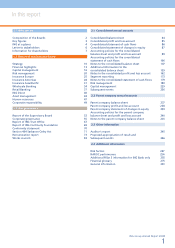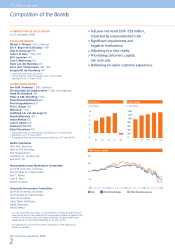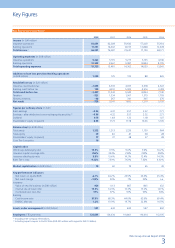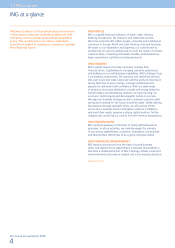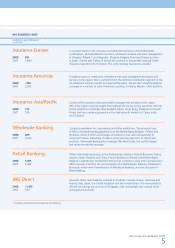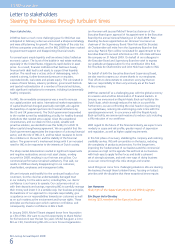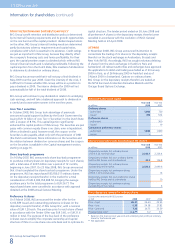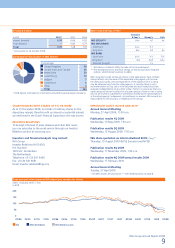ING Direct 2008 Annual Report Download - page 13
Download and view the complete annual report
Please find page 13 of the 2008 ING Direct annual report below. You can navigate through the pages in the report by either clicking on the pages listed below, or by using the keyword search tool below to find specific information within the annual report.
ING Group Annual Report 2008
11
Our efforts will be focused on disciplined execution of these plans
in 2009, specifically by:
putting customers first;•
preserving a strong capital position, including divestments that •
free up capital;
further mitigating risks; and •
bringing our costs in line with the operating environment.•
Putting customers first
The credit crisis has had a clear impact on customer needs, both
in terms of product offering, as well as servicing models. These
turbulent times prove once more that delivering an easier customer
experience and going back to basics should be an essential part
of our strategy. Hence, we will continue along the path chosen in
2007, when we launched our Easier programme, which emphasises
the attributes that build customer trust and competitive advantage
over the long term: customers expect us to be available when they
need us, to provide them with a clear overview of their financial
situation, to respond to their queries in a fast and efficient manner,
to be open and transparent about our products and services and
to provide them with objective and professional advice. Apart from
the need to reinforce our efforts to deliver an easier customer
experience, the crisis has created a shift in customer demand
towards products that offer wealth-protection and risk reduction.
Therefore, we will reposition our product portfolio to
accommodate changing customer needs.
Preserving a strong capital position
The economic environment has not only put pressure on the
profitability of our business, but has also led to an internationally
recognised belief that going forward, capital requirements for
financial institutions should be higher. Although our capital
position was above or in line with previously targeted levels
and regulatory requirements, in October we decided to further
strengthen our capital base in the form of the issuance of
EUR 10 billion of core Tier-1 securities to the Dutch State. As
a consequence, the ING Bank Tier-1 ratio rose to 9.32% as of
31 December 2008.
The current environment also forces us to reassess in what
businesses and geographies ING has a strong market position that
is sustainable for the long term. We aim to avoid asset growth in
pressurised sectors and continue our efforts to deleverage our
balance sheet and to reduce the volatility and complexity of our
portfolio. We will make a number of selective divestments outside
the core of our franchise to free up capital and simplify the
organisation. We will do so in a disciplined manner. In February
2009, we sold our interest in ING Canada, the largest provider
of property & casualty insurance products and services in Canada.
Mitigating risk
ING has been reducing risk across the balance sheet over the
course of 2008. We aim to further reduce our risk exposure in the
coming period. In 2008, we have started to reduce our real estate,
private equity, corporate bond and interest rate exposure. We sold
several equity stakes and implemented hedges. Moreover, we have
begun to cap balance sheet growth for the bank and reduced
market risk for insurance operations. In Taiwan, ING sold its life
insurance business to Fubon Financial Holding, which resulted
in a reduction of interest rate risk exposure.
the Benelux, where we aim to become the leading wholesale
bank. ING also has ambitions to be a market leader in Poland and
Romania, as well as in a number of key products globally, like
Structured Finance.
In December 2008, we completed the acquisition of the Turkish
voluntary pension company Oyak Emeklilik, which has been
integrated in Insurance Europe. Oyak Emeklilik will be re-branded
under the ING brand in 2009.
In the Americas, we are focused on the long-term growth
opportunities presented by the ageing of the US population and
the increasing wealth in Latin America. The acquisition of CitiStreet,
one of the major retirement plan service and administration
organisations in the US defined contribution market, provides
us with an expanded geographic footprint and broader service
offerings to customers. In Peru, we increased our stake in AFP
Integra to 80%, the number one pension fund company by
market share.
In Asia/Pacific, bank distribution was further reinforced through
an exclusive agreement with the Royal Bank of Scotland in
Hong Kong, and by sales expansion through TMB Bank from
the Bangkok region to the entire branch network in Thailand.
Furthermore, ING became one of the multi-region preferred
strategic partners of HSBC Insurance.
STRATEGY: ADJUSTING TO A NEW REALITY
Financial institutions like ING have an important role to play in
creating the conditions for social and economic progress, by taking
and spreading the financial risks of individuals and companies.
Yet, the credit crisis underscores that we can only do this if we are
trusted by our customers. Earning and maintaining customer trust
is therefore an absolute prerequisite for any financial institution
to operate. As the increased complexity of the financial services
industry has been a major cause of the crisis, going back to the
basics of finance is inevitable.
ING has a clear eye for what lies at the heart of our business:
collecting customer balances and redeploying these in the
economy, by means of a self-originated loan book consisting of
mortgages and corporate, private and other types of loans. We
are well aware of our responsibilities and will continue to do our
utmost to maintain the confidence of all our stakeholders and to
contribute to a proper functioning of markets. We will align our
long-term business strategy around a universal customer ideal:
saving and investing for the future should be easier.
Going forward we will take steps to strengthen our financial
position and adjust to the reality of the global recession while
keeping focus on our long-term priorities. In the short to
medium term, we will step up efforts to steer the business
through these turbulent times, to stabilise our company and
reinforce our credibility.


